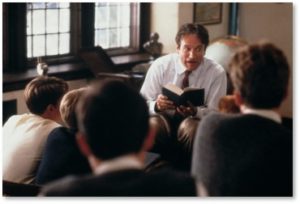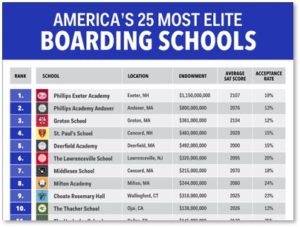Elite: A: The best or most skilled members of a given social group. B: A small and privileged group.
For the last two years, people have expended a lot of ink, made a lot of speeches, Tweeted a lot of characters, and Shared much on Facebook about so-called “elites.” Yet, we seem to define “elites” and “elitist” differently.
What Americans Believe are the Elites
 Many Americans believe that a person is elite because they have more education and know more things. They see professors, scientists, economists, teachers, writers, and artists as elites.
Many Americans believe that a person is elite because they have more education and know more things. They see professors, scientists, economists, teachers, writers, and artists as elites.
That has never been my definition. To me, these people have accomplished things in life as — men and women who have obtained an education and/or achievement through talent, diligence, intelligence, and creativity. The original elites, on the other hand, got where they are the old-fashioned way: they were born into it. That’s not to say that they did not work hard; they just didn’t have to.
What the Real Elites Are
The death and funeral of former President George H.W. Bush has brought the difference between these two definitions into print. In yesterday’s Wall Street Journal, Joseph Epstein defined “elite” the way I have thought about it since I was old enough to understand what a preppy is.
In his Wall Street Journal article, “The Last True WASP in the White House,” Mr. Epstein called the late President Bush “a true WASP in the full social context of the term,” and a man “to the manner born.” WASP, of course, is an acronym for White Anglo-Saxon Protestant. They are the scions of the Puritans and Pilgrims who settled New England in the 17th century. Mr. Epstein went on:
“The elder Bush came from a prominent Eastern Seaboard family, went to the right schools, had the right financial and legal connections, married within his social class, and shared a point of view on private life and an outlook on public service that was essential to the WASP culture.”
WASP Culture
 The WASP culture means that you take it for granted you will go to the best prep school. Next stop is Ivy-League university on a legacy acceptance. You don’t worry about whether you will be accepted or can afford it; those are givens.
The WASP culture means that you take it for granted you will go to the best prep school. Next stop is Ivy-League university on a legacy acceptance. You don’t worry about whether you will be accepted or can afford it; those are givens.
After graduation, you take a position in your father’s bank or the company/law firm of one of Dad’s friends, roommates, fraternity or eating-club brothers, The job is never advertised, you have no competition and there are no pesky interviews.
If you then want to go into public service, i.e. politics, you can do so. Having two last names — or more — helps. Just think a little about what this means.
An Unheard-of Luxury
For most Americans of Mr. Bush’s era (Yale 1945 – 1948), simply attending college was a challenge. Not only did you need the money for tuition, room and board, books, etc., you had to put in four years. Middle-class boys had neither the time nor the money. If they were fortunate enough to graduate high school at all, they had to go out and work to help support the family. Four years to study, knock around campus, join a fraternity, row crew, and meet girls at a dance were an unheard-of luxury.
 At his father’s funeral, George W. Bush said his father taught him that, “public service is noble and necessary.” True. But public service and a political office require more time and money. Even if Dad greases the wheels so your election is guaranteed, you still have to run for the office. That means months of campaigning, months in which you are not earning money to pay the bills and support either your family of origin or a new one after you get married. Either your family can support you or the firm where you work continues paying your salary in hope of gaining a influential friend in high places.
At his father’s funeral, George W. Bush said his father taught him that, “public service is noble and necessary.” True. But public service and a political office require more time and money. Even if Dad greases the wheels so your election is guaranteed, you still have to run for the office. That means months of campaigning, months in which you are not earning money to pay the bills and support either your family of origin or a new one after you get married. Either your family can support you or the firm where you work continues paying your salary in hope of gaining a influential friend in high places.
Former Bush wingman James Baker joked about how he had to stop Mr. Bush from saying, “My father inculcated in me a sense of public service” because it sounded too, well, elitist. And it was. Speaking to ordinary folks about your sense of public service when they are scrambling to pay medical bills, keep the electricity on or buy groceries constitutes elitism at its best.
I speak only of boys, of course, because girls were supposed to marry those Ivy League boys, not accomplish things on their own.
Not Just a Job, a Heritage
The young men of the WASP culture were raised to believe that running the country would be their job, their privilege, and their heritage. In The Atlantic, Franklin Foer comments in his article “The Last WASP President” that,
“All the florid remembrances are packed with fondness for a bygone institution known as the Establishment, hardened in the cold of New England boarding schools, acculturated by the late-night rituals of Skull and Bones, sent off to the world with a sense of noblesse oblige. For more than a century, this Establishment resided at the top of the American caste system. Now it is gone, and apparently people wish it weren’t.”
 Well, not me. Perhaps because I live in Massachusetts, I feel closer to the preppies and Ivy Leaguers who are preparing to take their place in public service. We have so many of them, after all. When my daughter lived in Andover I used to watch future senators, congressmen, ambassadors, and Supreme Court Justices jogging around the campus of Phillips Academy and past her front door. I did not hold them in awe.
Well, not me. Perhaps because I live in Massachusetts, I feel closer to the preppies and Ivy Leaguers who are preparing to take their place in public service. We have so many of them, after all. When my daughter lived in Andover I used to watch future senators, congressmen, ambassadors, and Supreme Court Justices jogging around the campus of Phillips Academy and past her front door. I did not hold them in awe.
Born with Silver Spoon
Why? Well, if you are born with a silver spoon in your mouth and eat off golden plates all your life, you don’t have to have ambition, talent, dedication, brilliance, creativity, or insight. Why ever would you when just being a WASP with the right connections is quite enough?
They kept themselves in enclaves like Walker’s Point in Kennebunkport, separated from the rest of us by “race, religion, and class.” They used perfect manners and good sportsmanship to fraternize with only the “right people.” When they screwed up, bankers and lawyers jumped in to fix the problem. And when all else failed, a nice thank-you note would do the trick.
In his New York Times article on “Why We Miss the WASPS,’ conservative opinion columnist Ross Douthat lauds the virtues of the WASP culture. He also mourns what he sees as its passing, and feels a premature nostalgia for its competence. He sneers at the “secular meritocracy” that has taken control of the White House since Bush 41’s departure.
Speak for yourself, Mr. Douthat. I am far more comfortable with “the dubious ideal of merit” than you are. And I disagree that the WASP’s “… more meritocratic, diverse and secular successors rule us neither as wisely nor as well.” But, then, my great-grandfather wasn’t governor of Connecticut, my daddy wasn’t partner in a law firm, and I didn’t go to Harvard.
The Chicken and the Egg
My brother says that I am envious and maybe he’s right. If so, it’s the envy of the chick that has to peck its way out of the egg while its nest-mate emerges unscathed from a shell someone else has peeled. Except that the chick that fights is stronger and has better survival skills. Perhaps that’s why the Old Guard—with its old money, two last names, prep school, and Ivy League, culture—is on the decline.
They are still elites, however, and they still hold plenty of power. Not the least of that power comes from the idea that it belongs to them by right, that ruling is their heritage, that money will always be available, contacts will always smooth the way, and things will work out fine.
If you think that professors, scientists, economists, teachers, writers, and artists constitute America’s elite, you either haven’t been paying attention or you have fallen for the picture of the Bushes as Texans. Phillips Academy and the Harvard Business School are in Andover, Massachusetts, Yale University is in Connecticut, Walker’s Point is in Maine. East Coast elites gets their start and summers in New England.

